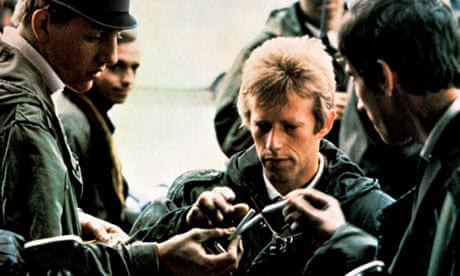Phil Davis calls himself "the nose-and-teeth man". He says he sometimes looks in the mirror and thinks: "Look at that tired old boat race." And it's true that, with his pink skin, squinting eyes and shock of vanilla hair, there is something of the naked mole rat about him.
But this week the largely unsung hero of British screen acting was cited by Daniel Day-Lewis as one of the biggest influences on his career. In an article for Port magazine, Day-Lewis ranked Davis alongside Robert De Niro, Meryl Streep and Marlon Brando: the actor's 1977 turn in Gotcha, he wrote, had made a "deep impression". Day-Lewis has won three Oscars (Lincoln, There Will Be Blood, My Left Foot); the 59-year-old, Essex-born Davis has a more modest collection of silverware – including a Critics' Circle prize and a British Independent Film award for his heartbreakingly fragile performance as the husband of abortionist Vera Drake (one of six films with Mike Leigh).
Davis might not have had a box-office hit, but he has been among the cream of British character actors for four decades – our Philip Seymour Hoffman, if you will. These days, he is known mostly as a dependable, vanity-free television actor: successes have included Smallweed in the BBC's Bleak House; a slick solicitor in Silk; the clerk in the legal drama North Square; and the sweaty cop in ITV's Whitechapel. (All but the Dickens has seen him cast alongside Rupert Penry-Jones; together they make a great tall/short, posh/prole, chalk/cheese duo.)
By the time he acted alongside Day-Lewis in The Bounty (one of the latter's first films, in 1984), Davis had already made his mark in theatre, working with legendary director Joan Littlewood; he was also part of the youthful ensemble of Quadrophenia. But it was his raging performance in the TV adaptation of Barrie Keeffe's play Gotcha that inspired a young Day-Lewis. Davis, then 24, played a schoolboy who holds several teachers hostage on a whim (he also played the original part on stage). "Barrie was a very important playwright," Davis told the Guardian in 2004. "What he was articulating was actual anger. His plays were the equivalent of punk. Loud, aggressive, what-about-me? pieces of theatre."
That Day-Lewis should single out Gotcha speaks of the typical education of a British actor forging a career in the 1970s and 80s. Television drama slots such as Play for Today, Screen Two and Film4 provided seedbeds for new talent, and showcases for existing ones. Davis first worked with Leigh in television. "The fascinating thing about Phil is that we've worked [together] from him being a naughty youth to a middle-aged man," the director told Amy Raphael in her book Mike Leigh on Mike Leigh. "He's completely rigorous, intelligent, rooted and with a sense of the real world. He's up for trying anything. Completely creative. And a very nice bloke. The interesting thing about him, however, is this,he's an actor of immense scope and versatility, but don't ask him to do an accent."
Regardless of the medium, Davis's stock-in-trade is an unshowy thoroughness. "Many of his characters aren't top dog, but they all have a kind of behind-the-scenes power," says Rachel Cooke, TV critic of the New Statesman. "That's what he's great at: Machiavellian, at-a-distance string-pulling, seething resentment, inverted snobbery, phony politeness in the face of another character's utter half-wittery. I love his commitment. Whitechapel was hokum, but you can't help but believe in Davis. He doesn't learn his lines; he ingests them. He has this amazing repertoire of tiny, piercing gestures. Look at his wince: no one winces like Phil Davis."
He can play men so gentle you'd like to keep them as pets, such as Cyril, the gentle Marxist motorcycle courier in Leigh's High Hopes. Or he might bite your hand off: he was terrifying as Yeti, the platinum-haired thug in Alan Clark's The Firm, and then pitiful as the weaselly robber who goes to pieces in Antonia Bird's 1997 thriller Face. Davis has directed TV and film (including the soccer hooligan feature I.D.) but it is in front of the camera that he has expressed himself most eloquently. About his craft, he is as circumspect as any performer. "I've never been able to talk properly about it," he has said. "I just do it. It's like asking a painter about painting. They dip the brush and put it on the canvas. All I know is that if something isn't brilliant, there's no reason that you can't deliver it to the best of your ability. You can make those four lines great."

Comments (…)
Sign in or create your Guardian account to join the discussion